 Petzlover
Petzlover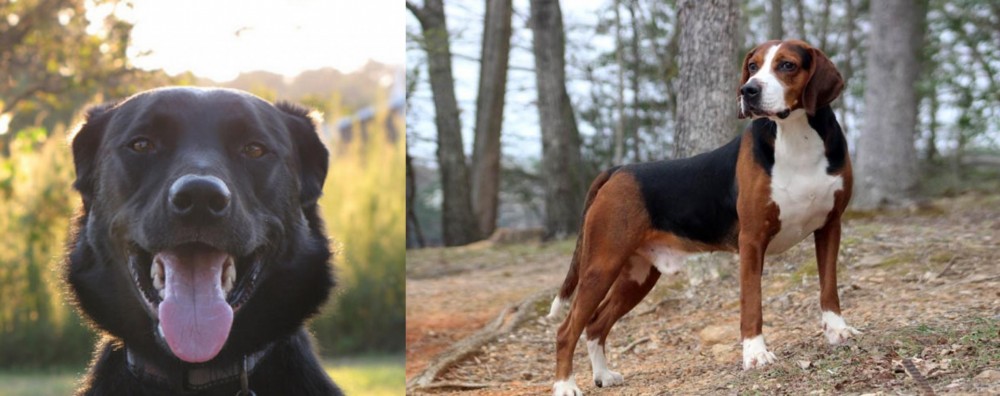 Borador is originated from United States but Hamiltonstovare is originated from Sweden. Both Borador and Hamiltonstovare are having almost same height. Both Borador and Hamiltonstovare are having almost same weight. Both Borador and Hamiltonstovare has almost same life span. Both Borador and Hamiltonstovare has almost same litter size. Borador requires Moderate Maintenance. But Hamiltonstovare requires Low Maintenance
Borador is originated from United States but Hamiltonstovare is originated from Sweden. Both Borador and Hamiltonstovare are having almost same height. Both Borador and Hamiltonstovare are having almost same weight. Both Borador and Hamiltonstovare has almost same life span. Both Borador and Hamiltonstovare has almost same litter size. Borador requires Moderate Maintenance. But Hamiltonstovare requires Low Maintenance
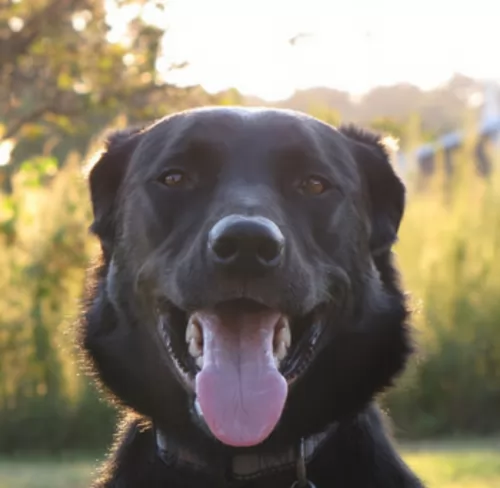 Hybrid breeds have become popular in the last decade or so. The Borador, hailing from Northern America, is one of these popular crossbreeds between two very popular dog breeds - the Border Collie and the Labrador Retriever. Between the two dog breeds, you get extraordinary intelligence, energy and a wonderful temperament.
Hybrid breeds have become popular in the last decade or so. The Borador, hailing from Northern America, is one of these popular crossbreeds between two very popular dog breeds - the Border Collie and the Labrador Retriever. Between the two dog breeds, you get extraordinary intelligence, energy and a wonderful temperament.
You first started hearing about this dog breed in the early 21st century. However each of the two breeds brought together to produce the Borador have got reasonable lengthy histories.
 Bred as a hunting hound, the Hamiltonstovare hails from Sweden, being founded in the late 1800s. He was first exhibited in Sweden in 1886.
Bred as a hunting hound, the Hamiltonstovare hails from Sweden, being founded in the late 1800s. He was first exhibited in Sweden in 1886.
Known also as the Hamilton or the Swedish Foxhound, the dog was developed by Count Adolf Hamilton who was also the founder of the Swedish Kennel Club. The dog’s ancestry includes some German Hounds as well as Harriers and English Foxhounds, and this has ensured he has excellent hunting instincts.
This dog breed got the name Hamiltonstovare in 1921 as a tribute to the person who created the breed and also the founder of the Swedish Kennel Club, Count A.P. Hamilton. The Hamiltonstovare isn’t recognized by the AKC but is recognized by the FCI and is also a member of the Foundation Stock Service. He is recognized by the Kennel Club in the UK as a Hound.
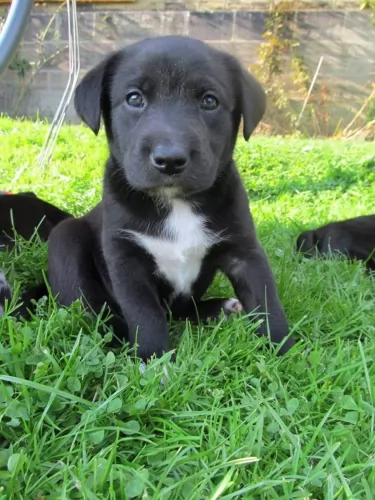 The Borador is a medium to large sized working dog which is well well-proportioned and muscular. His size can’t be carved in stone, but generally he will be in size from 40 – 57cm and weight in the region of 18 and 26 kg. His coat can vary significantly, leaning more towards one particular breed than the other. So the coat can be short and smooth or long and wavy or straight.
The Borador is a medium to large sized working dog which is well well-proportioned and muscular. His size can’t be carved in stone, but generally he will be in size from 40 – 57cm and weight in the region of 18 and 26 kg. His coat can vary significantly, leaning more towards one particular breed than the other. So the coat can be short and smooth or long and wavy or straight.
The Borador essentially has medium-sized ears which are floppy and the tail is medium-length. Sometimes the Borador will have the black and white coat of the Border Collie or he could have a brownish/beige colour from a golden Labrador.
When your energetic Borador is trained and socialized, he becomes a great family member and he gets on well with children and other pets.You’ll find that he often has the sweet, amicable temperament of the Labrador while having the sharp, alert intellect of the Border Collie.
Most Boradors are also good watchdogs and will bark at strangers, but because they are so amicable, from barking, they can quickly become a stranger’s friend.
 The Hamilton Hound is a good looking, well proportioned dog with an attractive, 2-layered, shortish, smooth, tri-colored coat of tan, black and white.
The Hamilton Hound is a good looking, well proportioned dog with an attractive, 2-layered, shortish, smooth, tri-colored coat of tan, black and white.
These dogs stand at about 49-61cm in height and they weigh 23 – 27kg. The eyes are brown and the ears are floppy. He is a deep chested dog with a long tail which he carries straight or which is somewhat curved. He has a longish head with a skull that is slightly arched and broad.
Friendly, social and amicable, the even-tempered Hamiltonstovare is a dog that loves to be with his human family. When you look at him you look at him as a friend as he has a calm, intelligent expression about him.
He is a stubborn, non-aggressive dog that is intelligent and this makes it easy to have him trained and socialized to make him obedient and to follow some easy instructions.
He is a very active dog and will love an owner who leads an active, outdoor life. Most Hamiltons love swimming too and he will be thrilled if you plunge in with him on a hot day.
He has always been a hunting dog, and while they love spending time with their human family, he loves the thrill of the hunt. He is a playful dog too, loving to entertain and be entertained, and he gets on well with children.
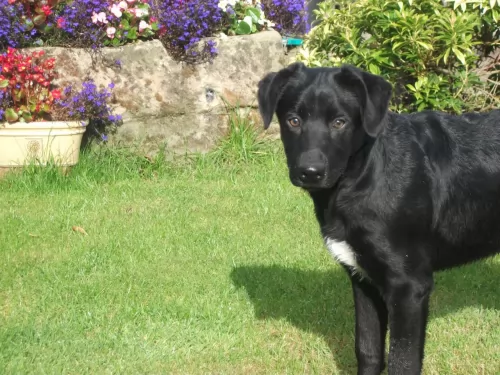 The Borador is an intelligent dog that can be trained. He is a sociable dog and is friendly to all members of his human family, willing to extend a paw of friendship to strangers as well.
The Borador is an intelligent dog that can be trained. He is a sociable dog and is friendly to all members of his human family, willing to extend a paw of friendship to strangers as well.
The Borador is also a friend of children and other pets. This combination of breeds is very energetic and you can’t just leave him for days on end in the backyard. He will need exercise and walks as well as ball games. When you become involved in his games, you tighten the bond between you and this is what this social, outgoing dog loves.
The Borador is going to make a wonderful pet because he is a mix of two very popular dog breeds. Give him all he deserves as a member of your family and you’ll have the perfect friend and companion for life.
 Hamiltonstovares make wonderful companions simply because they’re friendly dogs with stable personalities.
Hamiltonstovares make wonderful companions simply because they’re friendly dogs with stable personalities.
He is actually an ‘all-rounder’ dog – well proportioned and good-looking and with a solid personality to match.
He is lithe and muscled and as a multi-purpose dog, he has been used to follow scents and hunt down prey. These skills as well as his loyal characteristics have made him a versatile, sought after pet.
Another bonus when you own a dog like this is that he is also a low maintenance dog, shedding very little. He is intelligent too and easy to train, and all these qualities make him a wonderful pet to own.
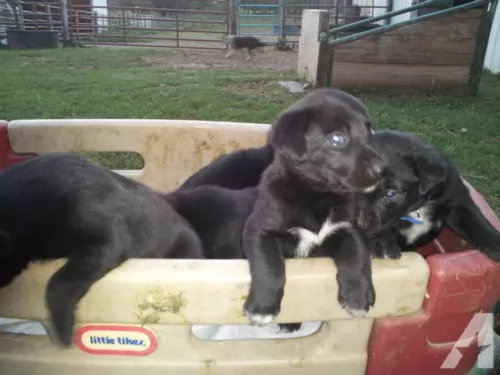 You won’t find serious health problems with your Boradors, as he is a robust breed. Nonetheless, there are some ailments that as a dog owner, you need to be aware of for your Borador.
You won’t find serious health problems with your Boradors, as he is a robust breed. Nonetheless, there are some ailments that as a dog owner, you need to be aware of for your Borador.
Skin ailments – you don’t want to see your dog scratching or licking continuously so you want to be aware of things like parasites and allergies. Skin diseases can be debilitating for a dog and can even require lifelong treatments. Yes, corticosteroids can help with itchy rashes, but the best move is to try and avoid skin ailments by ensuring a nutritious diet rich in minerals and vitamins and which includes some raw meat.
Always be checking your pet for skin problems such as ringworm, caused by a fungus and found on your dog and which appear as scaly patches and hair loss.
Hip Dysplasia – an inherited problem with the hip joints. No-one can predict when hip dysplasia settles in, but it can be as early as 4 months of age.Your dog shows signs of stiffness and may not be his energetic self. Some dog owners want to see certificates first that the parents of puppies have been hip-cleared before they buy a puppy.
 Every dog has different genetic make ups that affect them and they have different susceptibilities to illnesses. The average life expectancy of a Hamiltonstovare is between 10 and 13 years when he is looked after and well nourished with top quality food.
Every dog has different genetic make ups that affect them and they have different susceptibilities to illnesses. The average life expectancy of a Hamiltonstovare is between 10 and 13 years when he is looked after and well nourished with top quality food.
Some things to look out for are hip dysplasia, cancer, bloat and obesity.
Look out for obesity in your pet because just like with people, obesity leads to other diseases and complications in dogs such as diabetes, respiratory disorders, osteoarthritis and hypertension.
If your dog needs to lose weight, and you just don’t know how you’re going to deny him the treats he loves, speak to your vet who can even work out a weight management program for him.
Cancer is a formidable threat to all dog breeds. The most obvious sign that your dog could have cancer is abnormal swelling that gets larger under the skin. The idea is get get the lump removed and biopsied as soon as possible. Loss of appetite, weight loss, sores that don’t heal and bleeding or discharge are all signs of cancer.
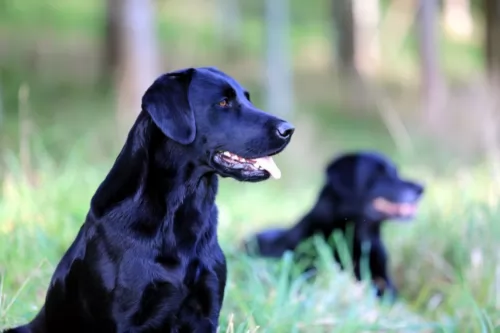 The Borador may have inherited the moderate shedder characteristics of the Border Collie or the more intense shedding of the Labrador Retriever. He will require a good brush at least twice a week to ensure you remove loose hairs so as to keep his coat shiny and healthy. Check your dogs ears too for yeast infections.
The Borador may have inherited the moderate shedder characteristics of the Border Collie or the more intense shedding of the Labrador Retriever. He will require a good brush at least twice a week to ensure you remove loose hairs so as to keep his coat shiny and healthy. Check your dogs ears too for yeast infections.
Puppies and young Boradors are full of energy and they will require a diet that has an excellent protein content. If you’re unsure about how to feed your Borador, speak to your vet as some dogs need more calories depending on their level of activity.
Certainly if your dog has allergies, you may have to look for a special diet but otherwise a top brand commercial dog food can be a good choice if you include some home prepared food such as rice, vegetables and meat. It is important to give your dog some raw meat every now and then as well. Always have a bowl of cool, fresh water available for your pet 24/7.
 The Hamiltonstovare has a double coat but even so, he is a low maintenance breed that will simply require a brush twice a week to remove dead and loose hair.
The Hamiltonstovare has a double coat but even so, he is a low maintenance breed that will simply require a brush twice a week to remove dead and loose hair.
Because he has floppy ears, it is important to check his ears because too much wax and debris can lead to a painful infection.
This is a high energy dog who will need the right amount of exercise as well as mental stimulation to be at his best. A nice walk every day will be excellent for him as well as the usual ball games in the garden.
If you get your Hamilton puppy from a breeder, it would be wise to stick to the same food they were feeding your puppy with. Suddenly changing his good could cause digestive upsets.
Every Hamilton requires top quality food that meets all his nutritional requirements. If you give him commercially manufactured food, make sure to follow the instructions with regards to the amount of food you give him as he can put on too much weight.
These dogs are known to suffer with bloat, so rather give him smaller meals than one large meal a day. Your Hamilton should never be exercised immediately after eating a meal. Remember to always ensure a bowl of fresh, cool water is always available.